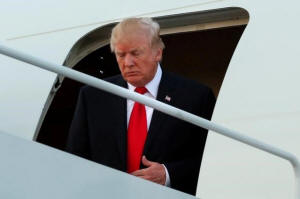|
Trump hamstrung at home as he seeks
closer ties with Moscow
 Send a link to a friend
Send a link to a friend
[July 04, 2017]
By Roberta Rampton
WASHINGTON (Reuters) - During his
presidential campaign, Republican Donald Trump praised Russian President
Vladimir Putin as a "strong leader" with whom he’d like to reset tense
U.S.-Russian relations.
But as Trump heads to his first face-to-face meeting as president with
Putin on the sidelines of the G20 summit in Germany on July 7-8, he is
under pressure at home to take a tough line with the Kremlin.
Allegations of Russian meddling in last year’s U.S. elections have
alarmed both Republican and Democratic lawmakers, who are pushing to
extend tough sanctions placed on Russia following its 2014 annexation of
Crimea, a peninsula belonging to Ukraine.
Lawmakers including Cory Gardner, a Republican senator from Colorado,
are also concerned Russia has prolonged the civil war in Syria by
backing its President Bashar al-Assad, a strongman whose forces have
used chemical weapons against insurgents and civilians. The chaos has
fueled instability in the region and a flood of migrants to Europe.
"President (Trump) needs to make it clear that the continued aggression
by Russia around the globe ... is unacceptable, and that they will be
held accountable," said Gardner, who was among six lawmakers invited by
the White House last month to discuss foreign policy with Trump over
dinner.
Meanwhile, the appointment of a special counsel who is investigating
potential links between the Russian government and members of the Trump
campaign has weakened the president’s ability to maneuver with Russia,
foreign policy experts say.
The U.S. intelligence community has concluded Russia sponsored hacking
of Democratic Party groups last year to benefit Trump over his Democrat
challenger Hillary Clinton. Russia has denied those allegations while
Trump has repeatedly dismissed the idea of any coordination between his
campaign and Russia as a "witch hunt."
Still, just the optics of Trump meeting with Putin, a former KGB agent,
are fraught with risk, foreign policy experts say.
"If (Trump) smiles, if he wraps his arm around Putin, if he says 'I'm
honored to meet you, we're going to find a way forward,' ... I think
Congress is going to react extremely negatively to that," said Julie
Smith, a former national security aide in the Obama administration.
EVOLVING U.S. POLICY
Trump has signaled an interest in cooperating with Russia to defeat
Islamic State in Syria and to reduce nuclear stockpiles.
The White House has been mum on what Trump would be willing to give
Russia in exchange for that help. But there has been speculation he
could ratchet down sanctions, or even return two Russian diplomatic
compounds in Maryland and Long Island. President Barack Obama seized
those facilities and expelled 35 Russian diplomats just before he left
office as punishment for the election hacks.
While some administration officials, including Secretary of State Rex
Tillerson, also support engagement, others, such as Vice President Mike
Pence and U.S. ambassador to the United Nations Nikki Haley, have taken
a hawkish line on Russia.
The lack of a unified strategy has left U.S. allies anxious. And it has
lowered expectations for American leadership to help resolve crises in
Syria and Ukraine, where Russian cooperation would be critical.
"Trump is like a horse with his front legs tied," said a German
diplomat, who spoke to Reuters on condition of anonymity. "He can’t make
any big leaps forward on Russia. If he tried people would immediately
suspect it was all part of some big conspiracy."
[to top of second column] |

President Donald Trump arrives at Joint Base Andrews, Maryland,
U.S., upon his return to Washington after a weekend at the Trump
National Golf Club in Bedminster, New Jersey, July 3, 2017.
REUTERS/Yuri Gripas

Trump's administration is still reviewing its Russia policy, a
process that may not be wrapped up for a couple of months, a U.S.
official said.
Speaking with reporters last week about Trump's upcoming meeting
with Putin, White House national security adviser H.R. McMaster said
his boss would like "the United States and the entire West to
develop a more constructive relationship with Russia. But he’s also
made clear that we will do what is necessary to confront Russia’s
destabilizing behavior."
THIRD TRY AT A RESET
Trump is just the latest president to grapple with the complicated
U.S.-Russia dynamic.
George W. Bush and Obama sought to improve the U.S. relationship
with Russia early in their administrations only to see relations
deteriorate later.
Among the concerns for this president is Trump’s apparent lack of
interest in policy details and his tendency to wing it with foreign
leaders.
McMaster told reporters that Trump has "no specific agenda" for his
meeting with Putin and that topics would consist of "whatever the
president wants to talk about."
Michael McFaul, who was U.S. ambassador to Russia under Obama, said
he feared Trump might be headed to the meeting without clear
objectives.
“I hope that he would think about first: what is our objective in
Ukraine? What is our objective in Syria? And secondarily, how do I
go about achieving that in my meeting with Putin?" McFaul said.
Other Washington veterans say Trump won't be able to make meaningful
progress with Russia on anything until he confronts Putin about the
suspected election meddling.
"(Trump) really has to raise the Russian election hacking last year,
and has to say something like, 'Vladimir, don't do this again. There
will be consequences,'" said Steve Pifer, a long-time State
Department official focused on U.S.-Russia relations.
So far Trump has shown little inclination to do so, a situation that
has heightened speculation about the potential impact from his
coming encounter with the Russian leader.
“The shadow of all these investigations hangs over this,” said
Angela Stent, a professor at Georgetown University and former
National Intelligence Officer for Russia.
(Additional reporting by Patricia Zengerle, Arshad Mohammed, Warren
Strobel, Richard Cowan, Jonathan Landay, John Walcott in Washington;
John Irish in Paris; Noah Barkin in Berlin; Christian Lowe in
Moscow; Editing by Caren Bohan and Marla Dickerson)
[© 2017 Thomson Reuters. All rights
reserved.]
Copyright 2017 Reuters. All rights reserved. This material may not be published,
broadcast, rewritten or redistributed. |